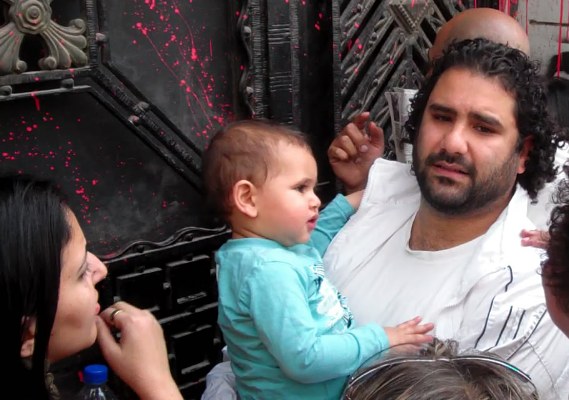Latest NEWS
- Aswat Masriya, the last word
- Roundup of Egypt's press headlines on March 15, 2017
- Roundup of Egypt's press headlines on March 14, 2017
- Former Egyptian President Hosni Mubarak to be released: lawyer
- Roundup of Egypt's press headlines on March 13, 2017
- Egypt's capital set to grow by half a million in 2017
- Egypt's wheat reserves to double with start of harvest -supply min
- Roundup of Egypt's press headlines on March 12, 2017
Alaa Abdel Fattah and 24 others' trial postponed to September 10

By Rana Muhammad Taha
CAIRO, Aug 6 (Aswat Masriya) - An Egyptian court postponed on Wednesday the retrial of political activist and blogger Alaa Abdel Fattah to September 10, alongside 24 other defendants.
Abdel Fattah and the 24 other defendants were sentenced to 15 years in prison in June for violating last year’s protest law, among other charges.
The retrial is taking place amid the detention of three defendants arrested after the issuance of the initial verdict; Abdel Fattah, Mohamed Nouby and Wael Metwalli.
Mahmoud Belal, among the defendants’ lawyers, said the court refused to release the three defendants pending their trial.
“This has no justification except the desire to transform preventive detention to a punishment,” Belal told Aswat Masriya.
The defendants were initially charged with protesting without permit, attacking and resisting the authorities among other crimes.
They were arrested after the authorities dispersed a demonstration denouncing a constitutional article which permits military trials for civilians outside the Shura Council on November 26. The protest was held while the constituent assembly, which drafted the constitution, was in session inside the Shura Council.
During the trial, the defence team requested summoning the witnesses in the case. Khaled Ali, among the defence team, specifically called for summoning members of the constituent assembly as witnesses, Belal said.
“We want them to testify whether the demonstration was held in protest over the constitutional article [on military trials] or if it was held for vandalism purposes as the prosecution claims,” Belal said.
The defence team also requested viewing and getting a copy of the CDs provided by the prosecution as evidence against the defendants. Belal said the court ordered delegating a committee from the Ministry of Interior to present the CDs. Yet the defence team will not be allowed to keep a copy of the CDs.
Former interim President Adli Mansour issued the protest law on November 24 to regulate peaceful assembly. The law has long been the epicentre of wide criticism by domestic and international human rights organisations for violating international standards for peaceful protests.
The legislation obliges demonstrators to inform the authorities of their intention to assemble three days prior to their scheduled events. It also gives the interior ministry the right to cancel, postpone or move protests.










